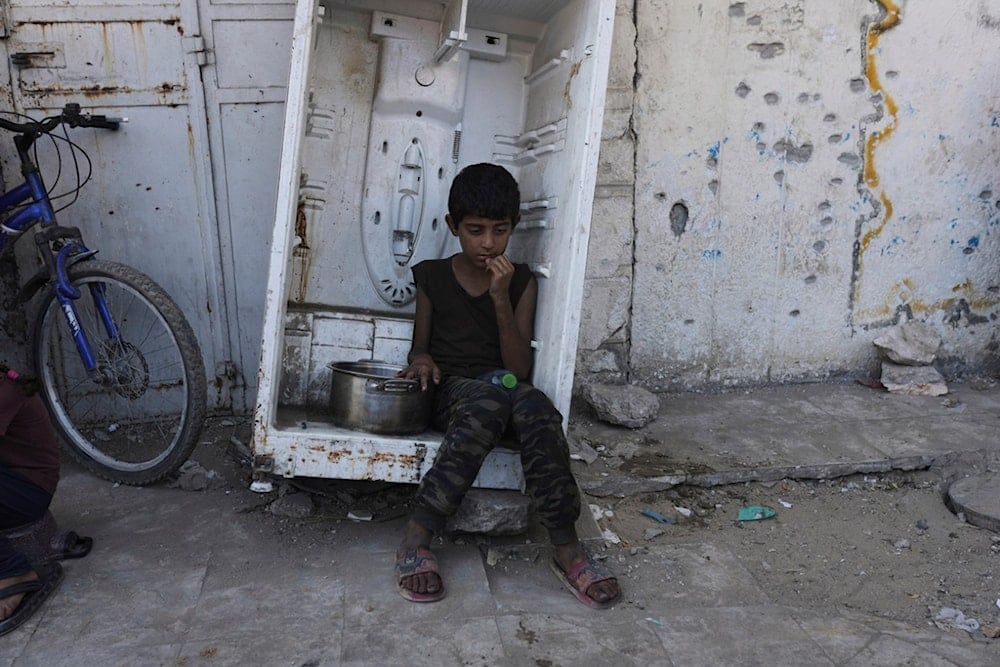Internal rift deepens in 'Israel' over Gaza concentration camp plans
"Israel's" plan to forcibly confine Palestinians in a so-called "humanitarian city" has been widely condemned as a blueprint for ethnic cleansing, fueling internal dissent, derailing ceasefire negotiations, and intensifying Gaza's humanitarian catastrophe.
-

A Palestinian child waits for donated food at a community kitchen in Gaza City, in the northern Gaza Strip, on July 14, 2025. (AP Photo/Jehad Alshrafi)
A controversial Israeli scheme to forcibly transfer hundreds of thousands of Palestinians into a militarized encampment in southern Gaza has drawn fierce condemnation from across political, legal, and humanitarian circles. Marketed by Israeli leaders as a "humanitarian city," the project has been exposed as a blueprint for ethnic cleansing, further entrenching "Israel's" ongoing war crimes against the Palestinian people.
Under the plan, approved by Israeli Prime Minister Benjamin Netanyahu and pushed forward by Security Minister Israel Katz, up to 600,000 Palestinians would be confined to a heavily restricted zone near the Egyptian border. Movement in and out of the area would be virtually impossible, with only third-country departures permitted, effectively stripping displaced Palestinians of their right of return.
Former Israeli Prime Minister Ehud Olmert, breaking ranks with the far-right government, described the plan bluntly, "It is a concentration camp. I am sorry." He added, "If Palestinians were forced to move to the camp, it would create a concentration camp... This is part of an ethnic cleansing."
Israeli ministers react
Israeli ministers responded not with reflection but with personal attacks. "Heritage" Minister Amichai Eliyahu smeared Olmert by invoking his past imprisonment, seeking to delegitimize his warnings rather than address the crimes being planned.
The initiative has also sparked an internal rebellion within the Israeli military. According to reports from Channel 12, IOF Chief of Staff Eyal Zamir voiced opposition to the plan in a closed-door security cabinet meeting. He warned that the displacement scheme would drain vital resources from military operations and captives recovery missions and could amount to a war crime. Zamir's office reportedly reiterated that the mass displacement of civilians is not part of the army's role, especially amid legal challenges from Israeli and international human rights advocates.
Despite warnings from his military leadership, Netanyahu doubled down, reportedly rejecting the army's proposed timeline and budget. "I asked for a realistic plan," he said, pushing for an expedited displacement operation, one that finance officials say could cost taxpayers 15 billion shekels a year, draining public funds from health, education, and welfare.
The political, legal, and economic opposition to the plan is further compounded by its role in sabotaging ceasefire talks. Hamas officials have rejected the "humanitarian city" as a deceptive euphemism for forced ghettoization. "This is utterly unacceptable and no Palestinian would agree to this," said senior Hamas official Husam Badran, who called the proposal a "deliberately obstructive demand" designed to collapse negotiations.
Even Israeli officials acknowledge the plan's potential to derail diplomacy. Broadcaster Kan revealed that senior leadership privately admits that Hamas would never accept such terms, even with so-called "modifications."
Massacre behind rhetoric
Meanwhile, Israeli war crimes continue unabated. On Sunday, airstrikes across Gaza killed at least 31 civilians, including children and families gathered near aid distribution points. A July 13 Reuters report confirmed that Israeli missiles killed eight children in the Nuseirat while they were collecting water, an act the military dismissed as a "technical malfunction."
In reality, this strike is part of a broader campaign of collective punishment. According to the UN, over 798 Palestinians have been killed while trying to access food or aid. Entire neighborhoods have been obliterated, more than 900 health facilities destroyed, and Gaza's water, sanitation, and energy systems have collapsed. Over 58,000 Palestinians have been killed, and more than 1.7 million displaced, many multiple times.
Despite this devastation, "Israel" continues to cloak its military objectives in humanitarian rhetoric. But as Olmert starkly put it, "When they build a camp where they 'clean' more than half of Gaza, then the inevitable understanding is that it is not to save [Palestinians]. It is to deport them, to push them, and to throw them away."
Read more: Gaza aid line targeted: Dozens killed, UN confirms 798 dead at sites

 4 Min Read
4 Min Read








